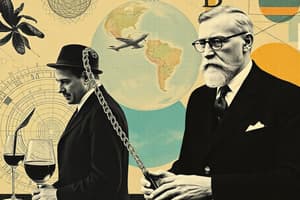Podcast
Questions and Answers
What significant discovery is Wilhelm Conrad Röntgen known for?
What significant discovery is Wilhelm Conrad Röntgen known for?
- Serum therapy
- The structure of the atom
- Classical conditioning
- X-rays (correct)
Which concept is Ivan Pavlov associated with?
Which concept is Ivan Pavlov associated with?
- Electromagnetism
- Chaos theory
- Classical conditioning (correct)
- Plum pudding model
What medical advancements did Kitasato Shibasaburo achieve?
What medical advancements did Kitasato Shibasaburo achieve?
- Discovery of X-rays
- Foundations of chaos theory
- Identification of electrons
- Development of serum therapy (correct)
What important theory did Jules Henri Poincaré contribute to the scientific community?
What important theory did Jules Henri Poincaré contribute to the scientific community?
Which physicist was awarded the first Nobel Prize in Physics?
Which physicist was awarded the first Nobel Prize in Physics?
What was J.J. Thomson's contribution to atomic theory?
What was J.J. Thomson's contribution to atomic theory?
What did Wilhelm Conrad Röntgen discover about X-rays in relation to materials?
What did Wilhelm Conrad Röntgen discover about X-rays in relation to materials?
What did Pavlov's experiments primarily focus on?
What did Pavlov's experiments primarily focus on?
Flashcards are hidden until you start studying
Study Notes
Wilhelm Conrad Röntgen
- German physicist who made significant contributions to physics and medicine.
- Discovered X-rays in 1895, a groundbreaking discovery that revolutionized medical imaging.
- Identified that electrically charged vacuum tubes emit rays that cause fluorescent screens to glow.
- Determined these electromagnetic rays could penetrate human skin to expose photographic plates, but were blocked by metal and bone.
- Awarded the first Nobel Prize in Physics in 1901 for his pioneering work with X-rays.
- Notably, he did not patent the X-ray, making it widely available for scientific and medical advancement.
- Known for his research in other fields, including mechanics, heat, and electricity.
Ivan Pavlov
- Russian-born physiologist who made significant contributions to the understanding of learning and behavior.
- Abandoned a religious career to pursue a scientific path, becoming a professor at the Military Medical Academy in St. Petersburg in 1890.
- Served as the director of the physiology department at the Institute of Experimental Medicine.
- Conducted groundbreaking research on digestive secretions in dogs, a crucial step in understanding how the body functions.
- Discovered the phenomenon of classical conditioning – a form of learning where an organism learns to associate a neutral stimulus with a response.
- This discovery, often called Pavlovian conditioning, had a profound impact on psychology and behavioral science.
- Awarded the Nobel Prize in Physiology or Medicine in 1904 for his work on digestive secretions.
Kitasato Shibasaburo
- Japanese physician and bacteriologist who made significant contributions to immunology and public health.
- Studied in Tokyo and Berlin, expanding his knowledge and expertise.
- Developed serum therapy, a revolutionary treatment using antibodies to protect against diseases like tetanus and diphtheria.
- In 1890, discovered that injecting tetanus serum (containing antitoxin produced in the blood of an animal exposed to tetanus bacteria) conferred immunity to the animal.
- Applied the same principle to protect against diphtheria, highlighting the effectiveness of serum therapy in fighting infectious diseases.
Jules Henri Poincaré
- French mathematical physicist who made significant contributions to mathematics, physics, and philosophy.
- Born in Nancy, France, and made significant contributions to understanding the universe and the nature of reality.
- Attempted to prove the stability of the solar system but discovered that even small variations in initial conditions could produce large and unpredictable changes in outcome, a phenomenon known as chaotic behavior.
- Published early work on chaos as early as 1908, laying the foundation for chaos theory which explains complex and seemingly random patterns in various natural systems.
- Wrote influential papers on electromagnetism that informed Einstein's work on relativity, demonstrating the interconnected nature of scientific discoveries.
J.J.Thomson
- English physicist considered a pioneer in understanding the structure of atoms and electricity.
- One of the first scientists to describe the structure of atoms.
- Identified "corpuscles," later named electrons, using a cathode ray tube, demonstrating the existence of subatomic particles.
- Determined electrons carry a negative electric charge and are about 2,000 times lighter than a hydrogen atom.
- Developed the "plum pudding" model of the atom, suggesting atoms contain a number of electrons embedded in a positively charged sphere, a significant step in unraveling the mysteries of atomic structure.
- His groundbreaking work revolutionized the understanding of atoms and electricity, laying the foundation for future advances in these fields.
- Confirmed the existence of isotopes, elements with multiple types of atoms that are chemically identical but differ in weight.
Studying That Suits You
Use AI to generate personalized quizzes and flashcards to suit your learning preferences.





